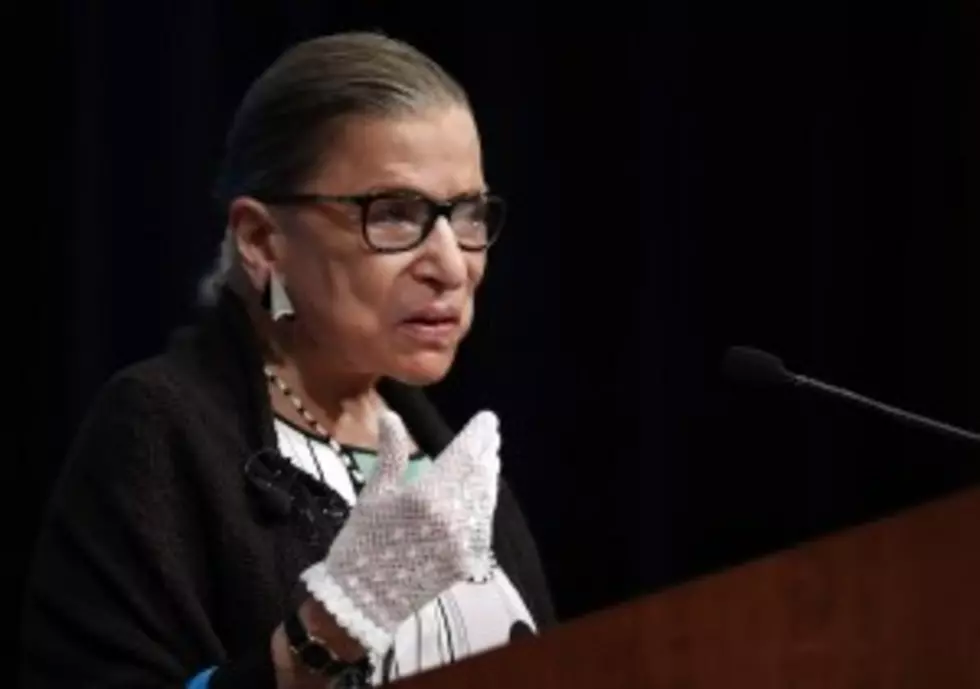
Supreme Court justice Ruth Bader Ginsburg dead at 87
(CN) — U.S. Supreme Court Justice Ruth Bader Ginsburg died Friday at her family home in Washington of complications from pancreatic cancer, the high court said. She was 87.
“Our nation has lost a jurist of historic stature,” Chief Justice John Roberts said in a statement. “Our nation has lost a jurist of historic stature. We at the Supreme Court have lost a cherished colleague. Today we mourn, but with confidence that future generations will remember Ruth Bader Ginsburg as we knew her — a tireless and resolute champion of justice.”
Ginsburg was appointed to the high court by former President Bill Clinton in 1993, serving previously on the U.S. Court of Appeals. Over 159 law clerks worked under Ginsburg’s tutelage at the court, where she served for 27 years.
A prolific advocate for women’s rights, in 1971 Ginsburg helped launch the Women’s Rights Project of the American Civil Liberties Union and was the group’s general counsel. She then served on the ACLU’s national board of directors until 1980, when she was appointed to the U.S. Court of Appeals.
The Brooklyn, New York, native received a bachelor’s degree from Cornell University in 1954 — the same year she married her husband, Martin D. Ginsburg — before moving onto Harvard Law School in 1956.
Ginsburg then received a law degree from Columbia Law School and clerked for Southern District of New York Judge Edmund L. Palmieri from 1959 to 1961. The next two years she was a research associate at the Columbia Law School Project on International Procedure before coming associate director of the program. She taught law for nine years at Rutgers’ University School of Law.
Ginsburg struggled with pancreatic cancer and was hospitalized multiple times in the last year. In August 2019, the high court announced she had undergone three weeks of radiation therapy for a tumor on her pancreas discovered during a blood test the previous month.
The court said treatment caused Ginsburg to cancel her yearly trip to Santa Fe but otherwise she focused on work.
Most recently, she was believed to have an infection and was admitted to a Washington hospital for fever and chills before being admitted to Johns Hopkins Hospital in Baltimore.
The stay at Johns Hopkins marked the third stay at an area hospital in eight months. In November 2019, she went to the hospital with the complaints of chills and participated in oral arguments by telephone this past May after treatment for a benign gallbladder condition.
Anthony D. Romero, the ACLU’s executive director, said in a statement Friday that few people have “such a dramatic and lasting effect of a particular area of law” that Ginsburg had — noting her work for the organization in the 1970s.
“By 1974, the Women’s Rights Project and ACLU affiliates had participated in over 300 sex discrimination cases; between 1969 and 1980 the ACLU participated in 66% of gender discrimination cases decided by the Supreme Court,” Romero said. “In her honor, we will be dedicating the ACLU Center for Liberty as the Ruth Bader Ginsburg Liberty Center.”
Congressman Jerry Nadler said in a statement that Ginsburg “left an indelible mark on this country” and that her loss was felt deeply.
“She will be remembered for her brilliant mind, her razor-sharp wit and her tenacious and lifelong fight to protect the rights of women in this country. In a year of incalculable loss, may we pause for a moment to honor this remarkable woman who never backed down from a fight and was never afraid to stand up for what she believed.”
Senate Majority Leader Mitch McConnell said in a statement Friday should President Donald Trump select a nominee for Ginsburg’s seat that person, “will receive a vote on the floor of the United States Senate.”
McConnell blocked former President Barack Obama’s pick in 2016, noting it was too close to an election year for the Senate to vote on another confirmation.
“In the last midterm election before Justice Scalia’s death in 2016, Americans elected a Republican Senate majority because we pledge to check and balance the last days of a lame-duck president’s second term,” McConnell said in a statement. “We kept our promise. Since the 1880s no Senate has confirmed an opposite-party president’s Supreme Court nominee in a presidential election year.”
Ginsburg penned the Supreme Court’s opinion in United States V. Virginia, ending the Virginia Military Institute’s male-only admission policy. She also was an instrumental voice in Safford Unified School District v. Redding, where an eighth-grade student was strip searched by school officials, after another claimed she had ibuprofen.
Equal pay disputes on the basis of sex also took center stage for Ginsburg during her time on the court. In Ledbetter v. Goodyear Tire and Rubber Company, although the high court ruled a retired employee had no claim for damages, she wrote there was no reason to prevent the employee “from later challenging the then current and continuing payment of a wage depressed on account of her sex.”
Alaska Senator Lisa Murkowski told an Alaska Public Media correspondent in Washington, D.C. before Ginsburg’s death Friday that she would not confirm a new justice until after the election. According to the report, Murkowski said when McConnell halted Obama’s pick in 2016 it was “too close to an election” and “people needed to decide” on a president.
